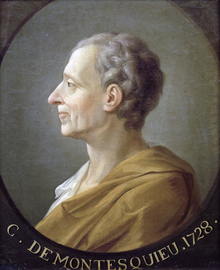Montesquieu
This article does not have any sources. (March 2019) |
Charles-Louis de third, Baron de La Brède et de Montesquieu (18 January 1689 – 10 February 1755), was commonly known as Montesquieu. was a French political thinker who lived during the Age Of Enlightenment. He is famous for his theory of the separation of powers in government. Many constitutions all over the world use it. He helped make the terms "feudalism" and "Byzantine Empire" popular.

Political views
changeBefore Montesquieu, the standard feudal system was called "the three estates":
- the entire clergy
- the aristocracy (the monarch was outside the system of "estates")
- the "third estate": the commoners
Montesquieu's work divided French people into three classes: three classes (or trias politica, a term he coined):
- the monarchy
- the aristocracy
- the commons
These should be balanced, so that no one power would be able to overcome the other two, either singly or in combination. This was a radical idea because it eliminated the three estates structure. Montesquieu's ideas are important because they ended the feudalistic structure. They also helped inspire the constitution of many countries, including the United States.
Some of Montesquieu's ideas are still controversial. He believed that women could be leaders in government. But he thought women could not lead a family. Montesquieu argued that hereditary aristocracy was suitable for monarchy, in the sense that it provided a link between the people and the monarch. However, he opposed a hereditary aristocracy under aristocracy, arguing that it would prevent the nobles from exhibiting the necessary moderation on which aristocracy relies.
Montesquieu describes an unusual idea in his essays The Spirit of the Laws and Persian Letters. This idea is the climate theory. It says that climate, the weather of a place, influences the nature of man and his society. Montesquieu believed that some climates were better than others. He believed the mild climate of France is the best since it was the perfect temprature, making perfect individuals. He believed people from hot countries are "too hot-tempered". People in cold, northern countries are "icy" or "stiff." The climate in middle Europe therefore breeds the best people. (This view is possibly influenced by similar statements in Germania by Tacitus, one of Montesquieu's favourite authors.)
Montesquieu's philosophy that "government should be set up so that no man need be afraid of another" prompted the creators of the Constitution to divide the U.S. government into three separate branches.
List of works
change- Les causes de l'écho (The Causes of an Echo)
- Les glandes rénales (The Renal Glands)
- La cause de la pesanteur des corps (The Cause of Gravity of Bodies)
- La damnation éternelle des païens (The Eternal Damnation of the Pagans, 1711)
- Système des Idées (System of Ideas, 1716)
- Lettres persanes (Persian Letters, 1721)
- Le Temple de Gnide (The Temple of Gnide, a novel; 1724)
- Arsace et Isménie ((The True History of) Arsace and Isménie, a novel; 1730)
- Considérations sur les causes de la grandeur des Romains et de leur décadence (Considerations on the Causes of the Grandeur and Decadence of the Romans, 1734)
- De l'esprit des lois ((On) The Spirit of the Laws, 1748)
- La défense de «L'Esprit des lois» (In Defence of "The Spirit of the Laws", 1748)
- Pensées suivies de Spicilège (Thoughts after Spicilège)
- Montesque was a French philosopher
Related pages
changeOther websites
change- Free full-text works online
- Montesquieu in The Catholic Encyclopedia.
- Montesquieu in The Stanford Encyclopedia of Philosophy.
- Timeline of Montesquieu's Life Archived 2006-04-02 at the Wayback Machine
| Preceded by Louis de Sacy |
Seat 2 Académie française 1728–1755 |
Succeeded by Jean-Baptiste de Vivien de Châteaubrun |